#dylan carlson
Explore tagged Tumblr posts
Text










Ask-A-Player: City Connect Edition ⚜️
#lars nootbaar#michael siani#ryan helsley#kyle gibson#ivan herrera#alec burleson#ryan fernandez#keynan middleton#dylan carlson#pedro pages#st louis cardinals#baseballedit#mlbedit#baseball#mlb#this took me a hot minute#i hate the stupid blue box they put on there w their name#these could've been so much nicer and bigger if they hadn't done that but!#ivan and those slutty shorts i love him <3#lars and his belly#obsessed#mine.#m:mlbgifs#m:gifs
22 notes
·
View notes
Text

#HELLO BOYS#i ned to know who took this#mlb#baseball#st louis cardinals#brandon crawford#nolan arenado#lars nootbaar#dylan carlson
16 notes
·
View notes
Audio
Even Hell Has Its Heros by Earth From Primitive And Deadly (2014) Instrumental / Psychedelic / Drone / Doom - from USA
#Earth band#dylan carlson#Primitive And Deadly (2014)#Even Hell Has Its Heros#instrumental#instrumental rock#psychedelic rock#guitars#drone#doom#doom metal#drone metal#FAVS#music
95 notes
·
View notes
Text
2 notes
·
View notes
Text

DYLAN CARLSON
27 notes
·
View notes
Text



9 notes
·
View notes
Text
196: Earth // The Bees Made Honey in the Lion's Skull

The Bees Made Honey in the Lion's Skull Earth 2008, Southern Lord (Bandcamp)
The most money I’ve ever spent on a vinyl record is on the stupid fucking quadruple LP Mellon Collie and the Infinite Sadness boxed set, but that was only because I allegedly scuffed the first track on the first side of LP1 of my friend’s copy while putting it away at a party, so I had to buy him a replacement and got his old dinged one—but I’ll write about that another time. The most money I’ve ever spent on a vinyl record I wanted was on Earth’s The Bees Made Honey in the Lion’s Skull, and specifically on one of the editions bound in faux Bible leather that Southern Lord reissues from time to time. From the first time I heard the record back in 2008, from the first time I read the title really, Bees has held a strange fascination for me. Despite being a broke college kid, I ordered a Bees Made Honey hoodie using my first credit card and hemmed and hawed over whether to snag the leather record, though I didn’t even know how to use a turntable. I didn’t end up actually scoring a copy till more than a decade later, by which time I’d already pretty well carved the thing’s grooves so deep in my brain I didn’t need to listen anymore to hear its contents.
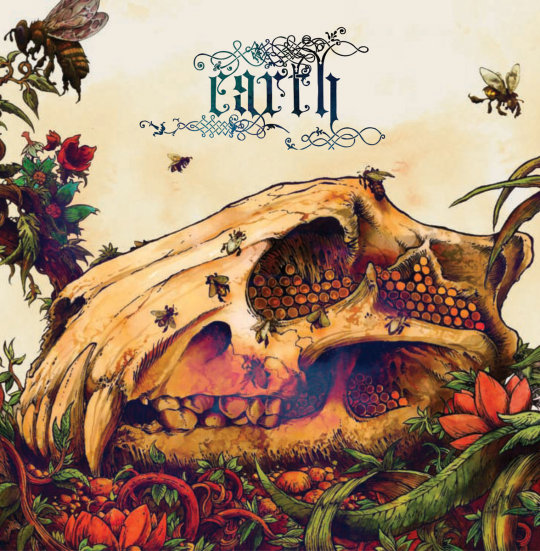
The inner sleeve.
Still, there’s the pleasure of handling it, opening up the gatefold and reading the hoary language in elaborately-filigreed gold text:
“from strength sweetness from darkness light the bees made honey in the lion’s skull”
A1. Omens and Portents 1: The Driver A2: Rise to Glory B3: Miami Morning Coming Down II (Shine) B4. Engine of Ruin C5: Omens and Portents II: Carrion Crow C6: Hung from the Moon D7: The Bees Made Honey in the Lion’s Skull D8: Junkyard Priest
youtube
I grew up just religious enough to really fear God and love His language, especially as filtered through all the fantastical art that’s borrowed the diction of the King James Version to command a sense of gravitas. It’s a tone of voice that still compels me, and it’s the perfect dressing for this era of Earth’s looming, desertified music. Starting with 2005’s comeback Hex; or Printing in the Infernal Method, Earth has been working on a form of Western-inspired instrumental post-rock that looks to the Bible and fire-and-brimstone writers like Cormac McCarthy for words to match the weathered lurch of Dylan Carlson’s lithic guitar. Bees continues this direction, and it’s broadly considered the best of the band’s later efforts: something elemental captured in the songs; extra pristine production; sterling contributions from Steve Moore on a variety of pianos and organs, plus famed jazz guitarist Bill Frisell; and above all the languid pulse of drummer Adrienne Davies, the sheer weight of her pauses (best exemplified on the title track).
When Davies joined the band in 2002, she became the long-term musical partner Carlson had never really had, and her playing has become as distinctive a signature of Earth’s sound as his. In the exhaustive 2023 documentary Even Hell Has Its Heroes, her interview is the most enlightening from a musical perspective. An amateur when she began casually jamming with Carlson, she soon found that all of the drumming instructors and guides she consulted emphasized focusing on how to refine the angles of her playing, minimizing the time and effort required to play a beat. But for Davies, playing in a band whose rhythm swells and resides like the breathing of a massive steer, this advice ran counter: her arms wave in slow, swooping arcs, drawing out the tempo in the air before falling into the drums, letting gravity provide the consequential force.
Despite the band’s mugshot stares and stupendous volume, that signal phrase holds: “from strength sweetness / from darkness light.” There’s no violence in this songs, only some obdurate quality of endurance; no aggression, only flickers of the transcendent among the amps. That’s the notion embedded in its title, a nourishing work transpiring within sinister ruins.
youtube
196/365
#earth#halloweek#drone#drone metal#post-rock#ambient americana#dylan carlson#southern lord#'00s music#minimalism#music review#vinyl record#seattle music#adrienne davies
9 notes
·
View notes
Text
st louis cardinals spring training pics pt 2
got a lot of these from @guentzel so credit to her!
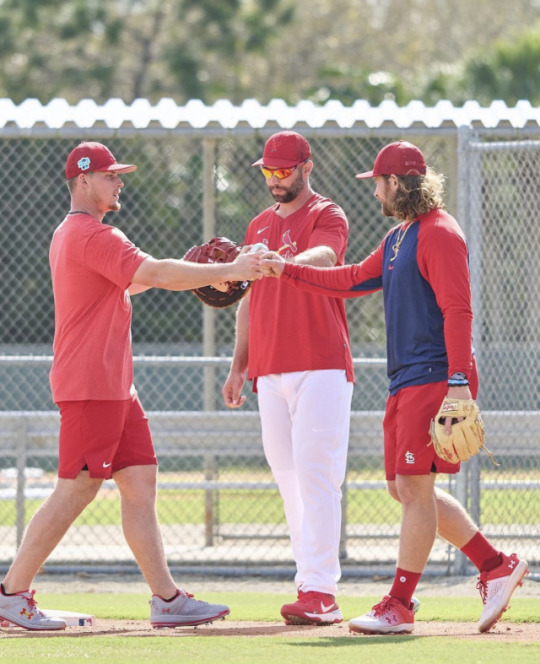


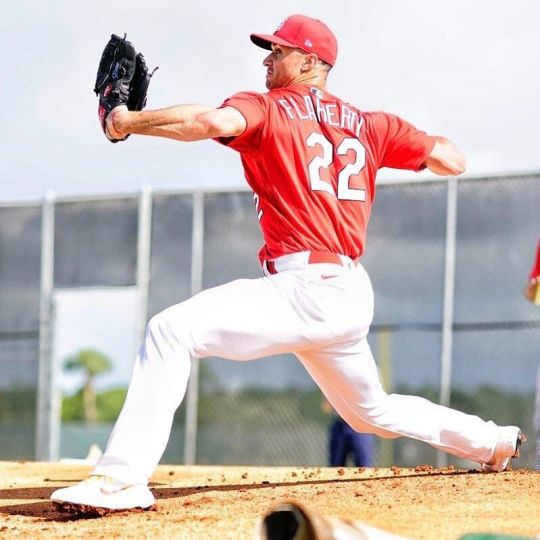
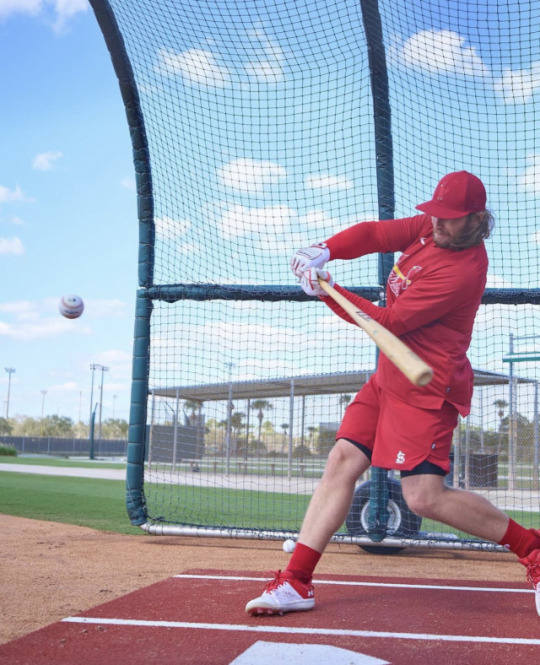
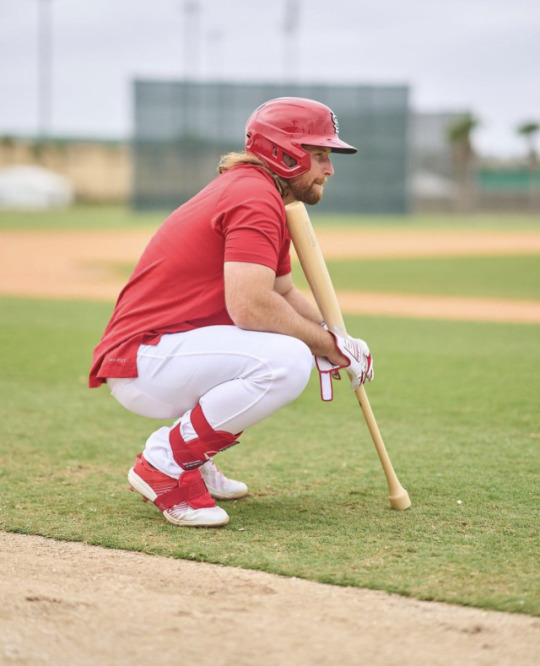

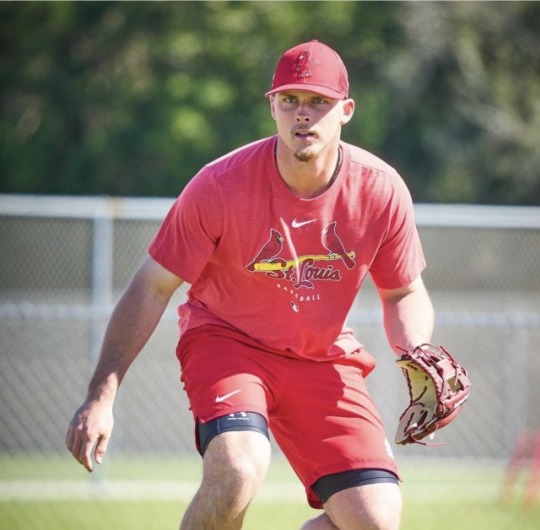

#brendan donovan#nolan gorman#dylan carlson#jack flaherty#tommy edman#paul goldschmidt#st louis cardinals#major league baseball#baseball#mlb baseball#stl#spring training
12 notes
·
View notes
Text

6 notes
·
View notes
Text


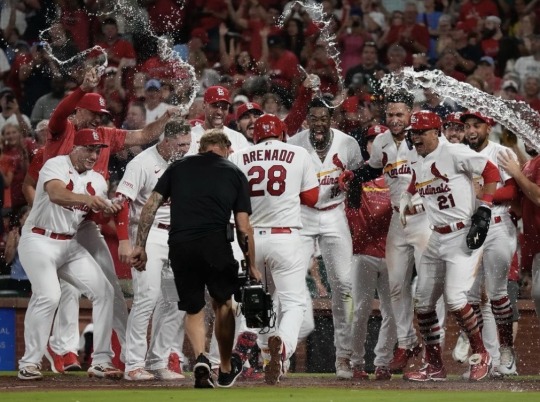
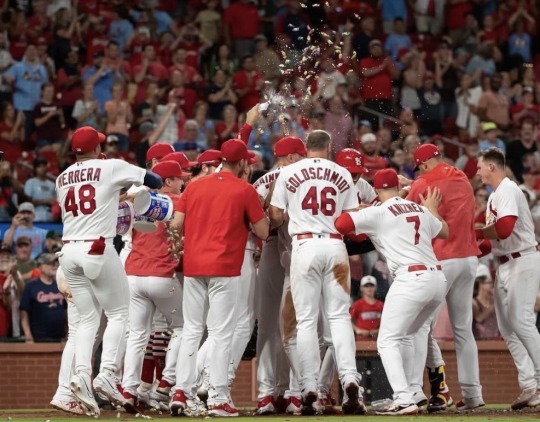


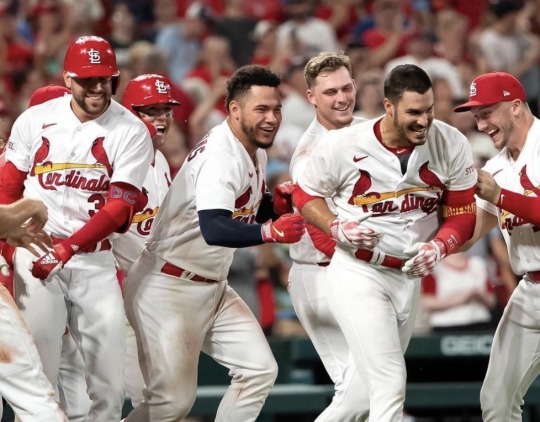

Nolan Arenado walk-offs against the Marlins | July 18, 2023
#nolan arenado#nolan gorman#willson contreras#paul goldschmidt#andrew knizner#lars nootbaar#dylan carlson#brendan donovan#adam wainwright#iván herrera#mlb#major league baseball#stl cardinals#st louis cardinals
11 notes
·
View notes
Text
Earth - Hibernaculum - 2007
15 notes
·
View notes
Text


#mlb#baseball#st louis cardinals#lars nootbaar#brandon crawford#tommy edman#steven matz#kyle gibson#dylan carlson
7 notes
·
View notes
Text

If y'all bored watch this documentary about Earth, the band, it's quite good and the soundtrack fucking slaps
5 notes
·
View notes
Text
The Unbearable Heaviness of Being
Source
Feeling Doom-Drone Classic Earth 2's Tremors 20 Years On
Dave Segal

Possibly more influential than Nirvana. Dave Harwell (left), Dylan Carlson (right).
Can you feel it? That massive, mind-blotting buzz from the planet's core? That's Earth 2: Special Low Frequency Version. Sub Pop released this record by Seattle duo Earth in early 1993. Its truculent tremors still ripple through the heavy-music underground. Nobody's made a big deal about 2013 being the landmark album's 20th anniversary. We need to redress this oversight. Admittedly, Earth 2 is no Nevermind in terms of sales (understatement, ahoy!), but its impact on subterranean metal may be just as historical as Nirvana's breakout LP has been in mainstream circles.
On Earth 2, guitarist Dylan Carlson—with help from bassist Dave Harwell—invented ambient metal, a devouring swarm of down-tuned guitar and bass dirges that coalesced into a threnody for forward motion... and possibly the human race. Never has sonic stasis been so domineering and exhaustive. It is Metal Machine Music as interpreted by a La Monte Young acolyte. Its infernal growl makes the Stooges' "We Will Fall" seem like sheerest New Age and Black Sabbath's "Iron Man" sound like bubblegum pop. Perhaps only Melvins' Lysol rivals it for sheer mass. Unlike most metal, Earth 2 insinuates doom. It needs no lyrics to convey the dread aura at its molten center. Earth 2 pulverized metal's cartoonishness and took the genre to the ashram.
To commemorate this vastly influential recording, The Stranger interviewed some of the key figures in the making of Earth 2, as well as a musician inspired by it. (Sub Pop boss Jonathan Poneman was unavailable for comment. Harwell did not respond to an interview request.)
BRUCE PAVITT
Sub Pop cofounder
What were your first thoughts when you heard Earth 2? The first time I heard the Earth tapes, I was struck by the conceptual nature of the tracks. Ambient metal. I was fascinated by the extreme nature and artistic vision of the band.
Did you and Jonathan Poneman have any arguments about whether Sub Pop should release the album? Jon and I both recognized that we needed some "sub" to go along with the "pop." It was important for the label to find a balance between the commercial and the adventurous.
Did Earth 2 present any particularly difficult marketing problems? Do you know how many copies it's sold? As for selling it, we felt that people would either get it or not. We didn't have high expectations. By allowing for elaborate packaging (double album, clear vinyl), we hoped that it would attract the interest of collectors and those who appreciated high-concept projects. At the time of release, we only pressed 2,000 copies of the record, which we knew would sell out. We did manage to sell some additional CDs... most likely another 2,000.
Do you view Earth 2 as Sub Pop's most extreme release? I do think that [Earth 2] is the most extreme recording ever put out by Sub Pop.
Where do you think Earth 2 fits in the grand scheme of rock music? I've always felt very proud of Earth 2. In the grand scheme of rock music, I think it stands next to Metal Machine Music by Lou Reed. Conceptual, ambient, challenging. My favorite Earth memory is when they opened up for the Ultra Lame Fest show at the Paramount in '92. Although they opened for more popular bands like Mudhoney, it was amazing to see them perform for a sold-out crowd at such a prestigious venue.
DYLAN CARLSON
Earth mastermind
What was your state of mind when you went into the studio to record Earth 2? There were a couple of ideas. We'd already done long songs. So we wanted to do one album-length piece. Unfortunately, this was before Pro Tools; you only get 30 minutes max per reel of tape, running at 15 ips [inches per second]. That's why there are three parts to [Earth 2]. At the time we were doing that, the CD was like 75 minutes long, and we wanted to fill the entire CD. Those were two of the parameters we were working with. The first stuff we had done at a little eight-track studio. This was our first time using two-inch tape, so we wanted to use every track. The idea was to try to make it as big as the live thing that we did. It's funny, because when I was working with Stuart [Hallerman of Avast! Recording Company] again on Angels of Darkness, we were talking about how if we had to do that album now, how differently we would have gone about it. We loaded all our gear in there that we used in the live show, then turned everything up and did a bunch of stuff that is technically incorrect [laughs]. We mic'd all the speakers individually and ran them to separate tracks. It turns out there's a bunch of fade cancellation and stuff like that that we didn't take into account. And then realizing later on that if you crank up a small amp in the studio and record it, it'll sound bigger than cranking up a big amp in the studio. So we basically set up and played live with that crazy mic'ing going on. Any tracks that weren't filled later, we went back and did some overdubs.
What was the rationale behind using drums very sparingly? We didn't have a drummer at the time, and I got tired of programming the drum machine. The first two tracks, when we played 'em live, had a drum machine, but I didn't really want to record with the drum machine. And I figured it would take tracks away from guitar.
The idea was to come up with overwhelming waves of guitar and bass? Yeah. On ["Like Gold and Faceted"], we tried to have some drums, but it didn't work out well, so we ended up using cymbal washes, but that was it for percussion.
Did you conceive of this album as having a functional value, as the text on the back of the record suggests? That kind of came after we did it, when I was coming up with the cover. I had worked at a record store at the time [Peaches, then Beehive], over there on 45th. I grabbed a bunch of stuff when I worked there, and a series of meditational cassettes Atlantic Records did in the '70s caught my eye. It seemed to fit the mood. There was one that was sea sounds, one that was nature sounds. It went along with a series of Medical records that I had. Stuart mentioned that our songs seemed to be part of something else; they fade up and fade out, but sound like they keep going. I like that idea. It would be like this was a record that was part of a series. But I don't know where the series is; this is the only one that survived. It's funny when I listen to Earth 2—not that I listen to it that often or anything—we were trying to make this really huge record, but in a weird way it has this claustrophobic feel to me. Because of the way we did it, it has this weird murkiness. If I had to do it now, it would sound a lot more expansive.
Do you ever perform those songs live anymore? No. We haven't played those in many a moon.
Is it because you don't want to wallow in nostalgia or is it because you're so far out of that mind-set? Some people had mentioned the idea of us doing that this year. Since Earth is still a going concern, I don't really want to do that. I'm not really into that idea. It would be one thing if Earth had stopped at a certain point and we were coming back. But the fact that we're still going, revisiting stuff... I mean, we revisit stuff in the live set, but when we do 'em, they're updated and altered for the situation. With Earth 2, those would be really hard to do that with because they're just one thing. I don't feel the need to repeat it. I'd like to be the one band that's not playing an album from 20 years ago. [Laughs] It makes sense to me if you're a band that has a hit or hits back then and you're playing the hits for the fans. [Earth 2] is not like that. It's funny how so many people now are like, "Earth 2, Earth 2," but at the time, not many people got it.
It's acquired this [reputation] rather than starting out thinking it was this. People may view it as a seminal work, and that's great. I'm glad people like it, but I still feel there are better Earth records and more to come. So maybe if Earth in the future are doing a last tour, maybe then we'd break it out. But until then, I really don't want to do that.
What about the photograph in the inner part of the CD with you and Dave Harwell aiming the guns at the camera? It seems at odds with everything else on the cover. We were both firearms enthusiasts. It was a jarring bit of aggression in what was otherwise a fairly soporific album cover. [Laughs]
Whose work is that on the front cover? I had originally picked out some other photos from a book, but trying to get the licensing from the photographer was proving difficult. So I went through a book of stock photography with Art Aubrey. They weren't free, but there was just a flat fee. I tried to find photos that were close to the ones originally wanted, which were from this travel book about India. There was a picture of this castle in Rajasthan that has all these little mini towers hanging off the wall. The pill bottles had the same effect. Obviously at the time I had narcotic interests. [Laughs] The front photo is a picture of Mongolia.
Do you view Earth 2 as the band's ultimate statement? Maybe the first iteration of the band, but even then I'm not sure, because Pentastar I really like a lot. But I don't think it's Earth's ultimate statement. That's another thing about redoing stuff like that—a record is a snapshot of a certain time and mental state and environment. You can't re-create that. There was some talk of doing Earth 2 stuff again this year. The only idea that sounded cool to me, I had been talking with Lori [Goldston] about doing an arrangement of it for strings and an orchestra. Something like that would be appealing to me more than a "here we are cranking out the hits on tour" kind of thing.
If an avant-garde classical ensemble could do Metal Machine Music, it seems like you could get Earth 2 into some slightly different context and it would sound just as good. There was talk with ATP about doing that. It's okay to mention now because it never happened. It looked like it wasn't going to work out. They could sense I wasn't super-psyched about it. The logistics were proving to be difficult.
What did your musician friends—particularly Kurt Cobain—think of Earth 2 when it came out? Kurt was kind of in the midst of exploding. [Laughs] Nirvana were not in town very much at that time. You never really know when you play stuff for your friends: They say they like it, but who knows? I can like people and not like their band, but a lot of people you can't do that with. They think that if you like them as friends and you say you don't like their band, they get all huffy or get in a snit about it. I've always been like, I can like you as a friend, but I don't have to dig what you do musically.
Whatever happened to Dave Harwell? I tried to contact him, but he never responded. I see him every now and then—not as buds, but around town. This one time I saw him a couple of years ago, I said, "What's up?" and he acted like I didn't exist. [Laughs] For some reason, he and Joe Preston have some ax to grind. I've never quite figured out why. Back then, there were people I actually fucked over, and I get along with them fine now. Slim Moon, too... I don't know what I did that made them so angry at me. I've never had any ill will toward any of them. I don't know what's up.
Do you think that this album has received its proper due from critics? It's not for me to say what its proper due is. People seem to revere it and mention it quite highly. A lot of people say they were influenced by it. I can't complain. I'm glad people dig it. It took a while, but it's always nice when your work is appreciated.
Do you think Earth 2 was the hardest one to accomplish of all your albums, or the easiest? Hallerman said you guys would join him in the control room while the guitar and bass were going. He was kind of surprised. Earth 2 went pretty easily. (A) The budget was small; (B) we didn't have a ton of studio time. The first two tracks we'd played live, so we had 'em pretty down. The hardest part was playing the first two without any rhythms, since we had a rhythm track to play it live. That was the most difficult aspect of it. And then trying to figure out the weird ways to get as many tracks as possible without... Nowadays, obviously, I would book studio time and do a lot of overdubbing, whereas back then we didn't have that luxury, so we have to get all these at once—especially trying to overdub on a 15- or 20-minute track. It's not like you can do a lot of punch-ins and stuff. It would get pretty messy and mind-warping. But it did go pretty smoothly. The fact that we were young and Stuart was young and willing to try crazy stuff that we'd probably know better about now helped. We were excited to be in the studio with someone paying for our record to be made rather than us paying for it.
Do you remember how Sub Pop reacted when they first heard the record? My relationship with Sub Pop had always sort of been with Bruce, who was the more adventurous, experimental guy. Jonathan's strengths were knowing what would sell—he definitely had an ear for pop and hard rock. They seemed into it, especially Bruce. Bruce asked us to be on the label. They put a lot of effort into it. They did the nice vinyl version and made some nice shirts for it. It didn't get a lot of reviews at the time, other than British press. I remember being excited because the header said, "Slow Death, Immense Decay." Any reference to a Slayer song in a review of something I did I was pretty happy about.
STUART HALLERMAN
Earth 2 engineer, owner of Avast! Recording Company
Can you discuss the recording sessions for Earth 2? Did things go smoothly? What was the mood like in the studio when the tracks were being laid down? It went quite smoothly. They had a plan laid out. It was mostly the two of them—Dave and Dylan. Some things took me by surprise. After tuning up their guitars and getting a good roar going, it was time to get the first bass and guitar tracks; I walked back to the control room, and they followed me there and sat down and said it was time to roll tape [laughs]. The guitars were being played by EBows out there. Okay, interesting. I hit "record," and that was the bed of the first piece of music. Then they went back to retune their guitars and got the EBows going again and again followed me back into the control room. They said, "All right, that'll be our second track." I thought, "What have I gotten myself into here? This is going to be the most boring week on earth." It was already an interesting mood there, but as soon as the layers of the two instruments two times were there, the magic tapestry began to appear. So while filling reels of tape with sounds that way, it was a very relaxed vibe. I wish more days went by like that.
Were there overdubs or was it all just done in real time? Did you go back later and do some editing? They did the background tapestry of the layers of drones and EBow tracks and they did multitrack layers of riffs and parts over that that they played. It was done to tape—two-inch 16-track back in those days. No editing, really.
Did this music present any special challenges to you? It seemed pretty unprecedented up to that point. Patience. One of the stated things of Earth at the time was to out-Melvin the Melvins. I'm appreciative of both the fast Melvins and later the slow Melvins, but that was a noble experiment.
Did you feel like something momentous was happening during the recording of Earth 2? Did it stand out among the sessions you'd done? Not in the way the question would necessarily be wanting me to say, "Yeah." To me, it just seemed like this really cool drone record that I personally liked when it was done. I'd put it on in my living room for roommates or friends or visitors at appropriate moments—maybe late at night or just at a certain place in the evening—put this on and people would say, "What's this?" They'd pay attention to it and then give me this weird look, like, "Why are you doing this to us?" Four minutes later, they'd say, "This is cool." They'd relax into it.
To me, it was almost a parlor trick or experimental music, lovely in its own little porcupine way. It faded into obscurity, and then [in 2003 Autofact Records] reissued it and the label wanted me to write liner notes for it. I had a story or two—the preproduction meeting and first day of the session and whatnot, a few anecdotes, a short remembrance of the making of. Then, while checking the spelling of the members, I learned that unbeknownst to me, in the intervening years, around the world, people were doing doom-drone rock. I was pretty unaware of that. I knew about Sunn O))) and Boris and stuff like that, but didn't really get that there was this whole genre of this stuff. It might've even been before Sunn O))) and Boris. The momentous thing was there, but I was certainly taken by surprise that anyone had noticed or had spawned a genre.
Has anything you've worked on since then surpassed Earth 2 in sheer intensity and heaviness? Sunn O))) and Boris, the planets that orbit around Earth. There's some bombastic stuff that attempts to out-Melvins Earth. There was a Sunn O)))/Boris split record and one of the joking ideas was to release it instead of in a 5.1 surround sound, in 1.5 mono plus five subwoofers. For a moment we thought, "Why wouldn't we do that?" There was a mocking one-tenth-serious proposal to do that with the Sunn O)))/Boris split.
STEPHEN O'MALLEY
Guitarist for Earth-influenced band Sunn O)))
What thoughts were going through your mind the first time you heard Earth 2? What sort of associations did this music trigger in your head? I was living in a house in the U-District. A friend of mine, Curtis Pitts, worked at Sub Pop. He'd come over and hang out. I lived with six people at one of these terrible college houses. He brought over a promo of Earth 2. He wanted to give it to me because Dylan was wearing a Morbid Angel T-shirt on the promo photo. I was really into death metal. He thought I would respond to it. I did, but in a quite different way. I think I was 19 or something. It was my first year at the University of Washington. I was totally getting into LSD and black metal, as a graduation from death metal. Earth 2 was very different from anything I'd heard before. It kind of fit into that frame somehow. I didn't have any real experience with experimental music, so probably like a lot of people who got into that, we were coming from metal. It's kind of a gateway into minimalist music and experimental music—something that now over the years I've been educated on. But at the time, hearing purely instrumental guitar music was rare, especially in this format that I know now is referencing La Monte Young and raga music and various other types of meditational music. To a 19-year-old death-metal kid, it sounded like slow Slayer. Melvins had done some stuff like that, right around the same period, actually, but Melvins were always clearly a rock band. Earth 2 was the most non-rock album that they did. It's the most abstract album they did. Although some of the rock stuff they did on Pentastar is pretty abstract.
I actually saw the Earth duo of Dylan and Dave Harwell play at that time at the Sub Pop Ultra Lame Fest. I think they played right before Mudhoney and right after Seaweed. Earth played some riffs that I recognized from Earth 2, but the audience was not into it. It was at the Paramount Theatre, and after a stage-diving Seaweed set, it was like, "What the fuck is this?" [Laughs]
Did Earth 2 sound to you like an ultimate statement, a kind of ground zero for heavy music? No, it never did. I think people give it more credit than it deserves. I think it's a great experimental record. I don't know if Dylan was trying to make an ultimate statement about music. I think he was trying to follow his ideas and interests into another area. Which is how he still does music. He follows his own path. People worship the past—especially art and music and literature and film. Various works are worshipped as being these pinnacles, and in some cases they were meant to be by the creators, but generally they pick up that reputation or presence after the creative process is done.
I love [Earth 2]; I was very educated by it as a guitar player and a musician, but I don't know if the album itself is really that important in that way. It affected some people. That band was put out on Sub Pop [because Carlson was Kurt Cobain's buddy]. Poneman and Pavitt wanted to please Kurt, so they put it out. Sub Pop didn't know what the fuck they were doing. Now, of course, they've re-pressed all these old records. When they actually came out, it was like, "Whatever," you know? "Bleach sold another 50,000 copies; sure, we'll put out another Earth record. Whatever."
It may be one of the most interesting records the label put out, as far as minimalist music. There's not much minimalist music on that label. It's a great doorway, for someone coming from metal. It introduced New York minimalist music like Tony Conrad, Glenn Branca, guitar orchestra music, La Monte Young, the Western take on raga music. It still sounded heavy, like slowed-down Slayer, as it always was described, but it was drone music played with guitars, extremely long songs.
What do you think about Earth 2 today, 20 years after its release? Do you think the album has gotten its due from the press and the public? I think it's a historical album, and what more could you ask? It's 20 years later, and people still consider it to be a very important record. Every time Sunn O))) puts out a record, [Earth 2] gets mentioned—which is a compliment for us. It's a tower in the musical world. I don't know if it's due anything. Earth got its due when Dylan re-formed the band and turned it into a real band, who produced a lot more music that's more important than that album, actually. That Earth has continued to make interesting, compelling music on their own terms, that's more important. It's nice to have Earth 2 in the background.

#Earth#doom metal#drone metal#Earth 2: Special Low Frequency Version#Sub Pop#Dylan Carlson#Ambient metal
4 notes
·
View notes
Text








Tyler O'Neill takes 9. Last worn by Keon Broxton in 2019.
Ramón Laureano takes 12. Last worn by Connor Norby in 2024.
Dylan Carlson takes 15. Last worn by Austin Slater in 2024.
Tomoyuki Sugano takes 19. Last worn by Cole Irvin in 2024.
Andrew Kittredge takes 39. Last worn by Corbin Burnes in 2024.
Daz Cameron takes 41. Last worn by Tyler Nevin in 2022.
Charlie Morton takes 50. Last worn by Bruce Zimmermann in 2023.
Gary Sánchez takes 99. Last worn by Jesús Aguilar in 2022.
#Baltimore Orioles#tyler o'neill#ramon laureano#dylan carlson#tomoyuki sugano#andrew kittredge#daz cameron#charlie morton#gary sanchez
4 notes
·
View notes
